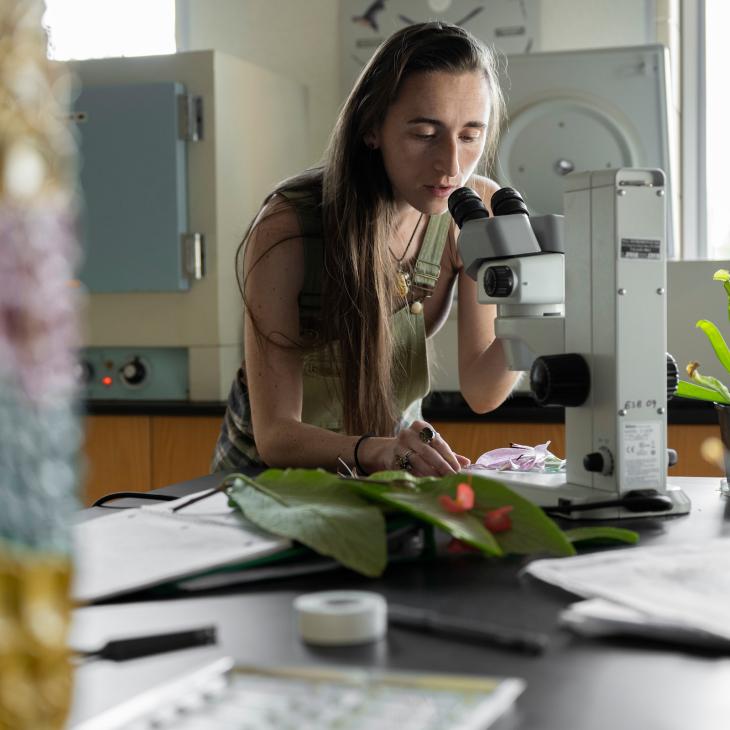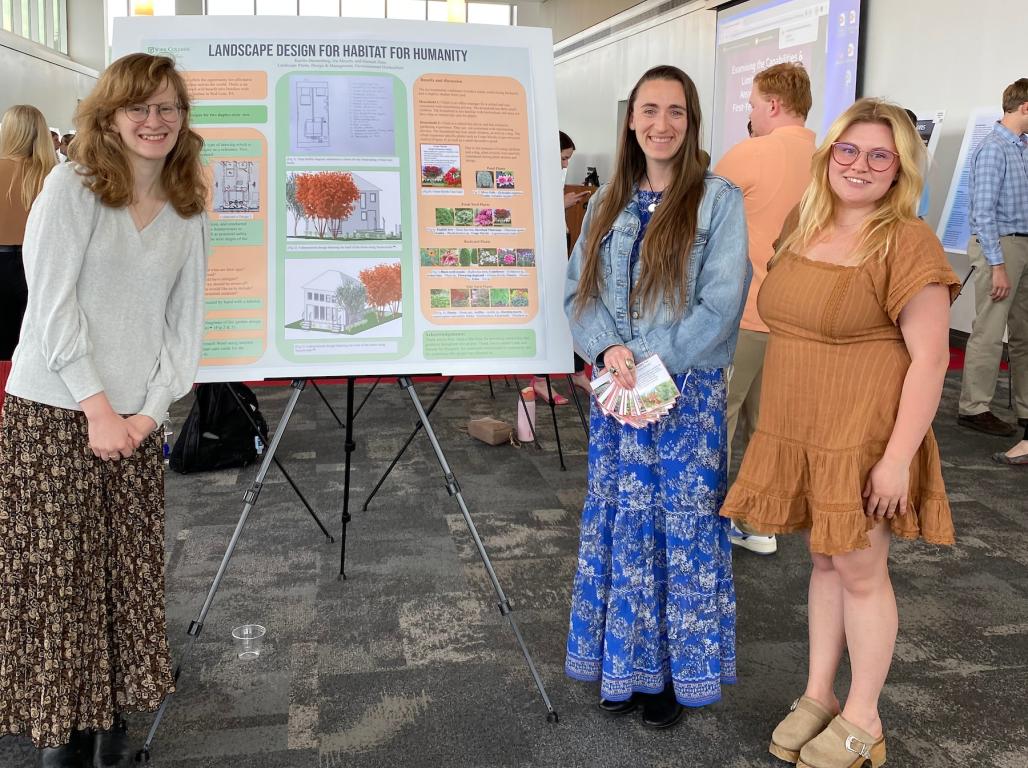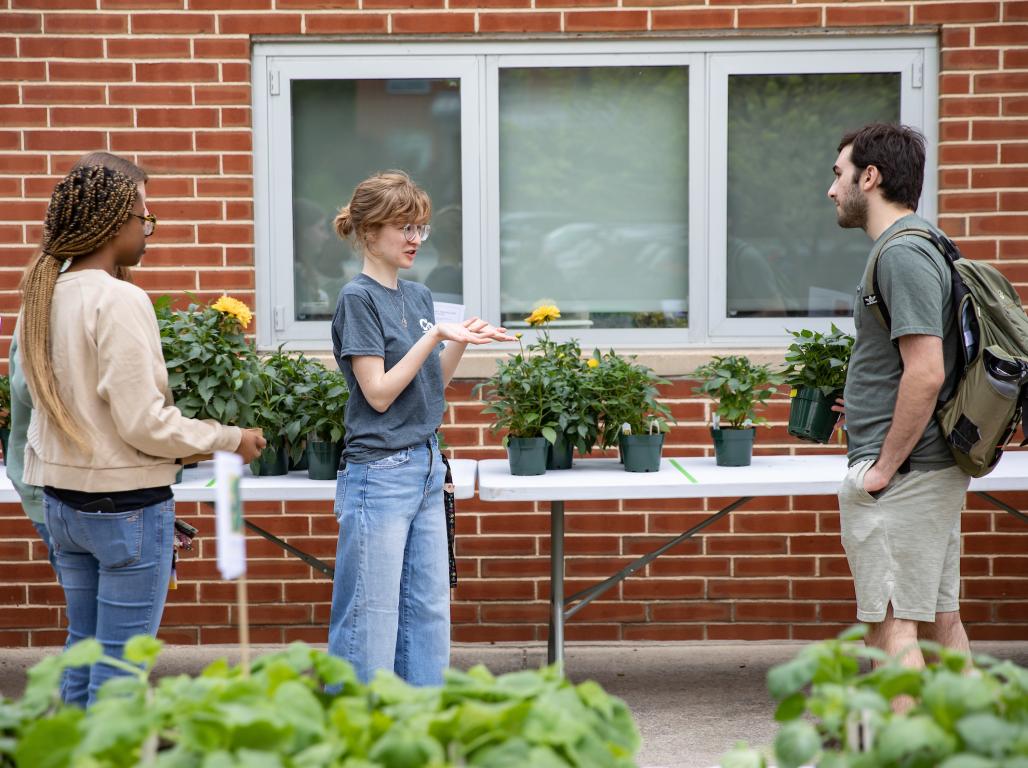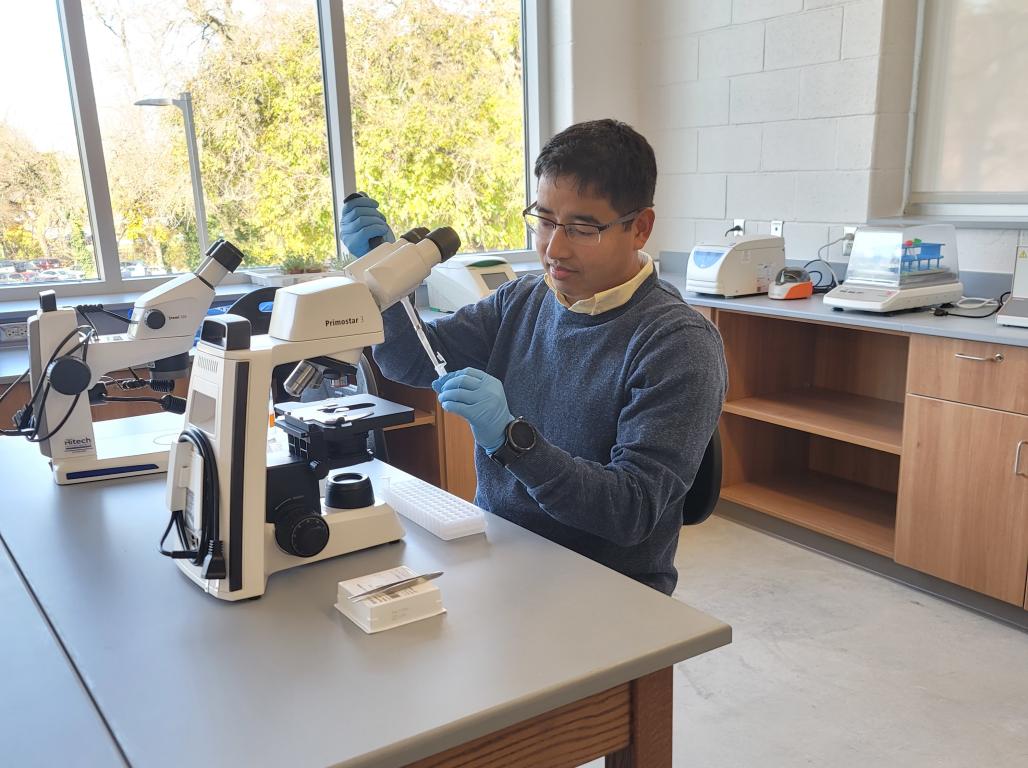Environmental Horticulture


Prepare for High-Demand Jobs in Plant Science, Production, and Design.
The Appell Environmental Horticulture Program (Bachelor of Science) at York College of Pennsylvania immerses students in the science and the business of growing and using plants while responsibly caring for the world’s soil, air, and water resources.
As an Environmental Horticulture major, you’ll complete hands-on learning opportunities in the classroom, greenhouse, and laboratory. You won’t just learn how to maximize crop yields; you’ll become equipped to contribute to global change through real-world research projects and a 50-acre horticultural learning lab.
Global climate change, pollution, and widespread food insecurity and insufficiency have created an increased need for professionals educated in horticulture, plant science, and sustainable growing practices. Prepare to meet that need at York College.
About the BS in Environmental Horticulture
Horticulture Program Requirements
The BS in Environmental Horticulture curriculum immerses students in two pillars of study: food plants and their global use, and ornamental plants and landscaping. Both areas emphasize sustainability and environmentally responsible practices in preparation for careers managing production systems at any scale.
Requirements for the Environmental Horticulture major span core major and general education classes, electives, and project- and work-based learning opportunities. In total, the Bachelor of Science degree requires 120 credit hours.
Environmental Horticulture Courses
Courses in the Environmental Horticulture major program are designed to help students develop knowledge in ecology, biology, plant nutrition, and plant management, as well as economics and business concepts.
Horticulture courses you’ll take include:
- HRT 100: Plant Science
- HRT 310: Economic Botany
- HRT 355: Vegetable and Fruit Production
- HRT 350: Landscape Plants, Design and Management
- HRT 460: Sustainable Horticulture
In addition to discipline-specific instruction, you’ll learn the management, marketing, communication, and critical thinking skills necessary to apply horticultural knowledge in any work environment through courses such as:
- ENT 260: Entrepreneurship and Small Business Management
- HRT 420: Greenhouse and Nursery Operations
- MGT 150: Principles of Management
- HRT 480: Internship
Earn a BS in Environmental Horticulture at York College of Pennsylvania
Earning a Bachelor of Science in Environmental Horticulture at York College of Pennsylvania creates opportunities for careers in a variety of work environments, from the field to the greenhouse, to sustainability organizations.
Find your success and make a difference locally, nationally, and globally. Take the first step and review admissions requirements.
Request more information or apply today to York College’s Environmental Horticulture degree program.
Environmental Horticulture Career Preparation
No matter your interests, York College’s experienced faculty will guide you toward academic and experiential learning opportunities that allow you to build a strong professional network in your ideal subject area.
Whether you prefer getting your hands dirty in the soil or staying clean in a high-tech greenhouse, prepare to enter the global horticultural industry as an independent entrepreneur or a competitive and valued employee in areas such as:
- Fruit and vegetable production
- Landscaping and turf operations
- Nursery operation
- Greenhouse operation
- Urban food production
- Food security
- Floriculture
- Soil and plant nutrition management
- Integrated pest management
The well-rounded BS in Environmental Horticulture degree program positions students to pursue fieldwork and research positions, careers producing and marketing ornamental and food plants, community outreach work, and more. Graduates may find opportunities in roles such as:
- Research Technician
- Crop Systems Specialist
- Greenhouse Grower
- Horticulturist
- Community Educator
- Entrepreneur
York College’s Environmental Horticulture major program intentionally trains students in management and encourages research and applied opportunities. A solid foundation in these fields will help you excel as a professional, whether you explore starting your own business in foraging, greenhouse farming, or horticultural sales, or you smoothly transition to careers at national and international corporations.
Preparation for Advanced Professions
If you’re interested in enacting high-level change in sustainability, conservation, climate change science, crop science, policy, or education, further graduate-level credentials are typically needed.
Majoring in Environmental Horticulture is the ideal first step for students interested in pursuing graduate education leading to advanced careers in plant science, horticulture, ecology, agriculture, plant biotechnology, public policy, education, business, and more.
Horticulture Degree Salary and Career Outlook
Throughout the horticulture industry, demand is great for well-trained professionals who can combine optimized production systems with sustainable practices. Students in the BS in Environmental Horticulture program develop the highly relevant skills necessary to grow healthy, nutritious food and manage beautiful landscapes without harm to soil, water, and the global climate.
According to the Bureau of Labor Statistics, agricultural and food scientists earn an average annual salary of $74,160 with employment growth projected at 8%, higher than the average of all occupations. The BLS reports that agricultural managers such as farmers can earn an average of $73,060 per year. Careers in conservation science are projected to grow 5% over ten years by 2031 and can earn an annual average salary of $63,750.
Horticulture Internship Opportunities
Each Environmental Horticulture major completes an internship relevant to their specific career interests. Local employers in a number of industries offer horticultural internship placements granting professional experience in greenhouse operations, field production, indoor hydroponics production, and landscaping.
Learn how the Career Development Center assists with internship placement.
Hands-On Community Projects
From the moment you enter the BS in Environmental Horticulture program, you’ll be exposed to valuable and relevant project-based experience in plant science and the management of sustainable growing practices.
Expanding upon in-lab projects relating to situations faced by professional growers and landscapers, students majoring in Environmental Horticulture participate in joint projects with local businesses and organizations. You may gain direct professional experience tackling food production matters or creating innovative landscaping solutions.
Environmental Horticulture Student Research
If you’re interested in following a career path in research or laboratory/field work, understanding research methods is essential.
Environmental Horticulture coursework allows students to develop individual or group research questions and endeavor to find answers utilizing state-of-the-art equipment and facilities. From botany to soil science and vegetable production to hydroponic systems, York College’s ample research projects allow students to pursue demonstrated knowledge in their ideal field.
Learn about undergraduate research at York College of Pennsylvania.
Collaborate on Sustainability Projects
At York College, environmental sustainability is also an ever-growing focus of our campus culture. Several student organizations are involved with sustainability projects on campus and in the local community, including the student-run Spartans for Sustainability and the Student Senate.
The President's Task Force for Campus Sustainability (PTFCS) is the center of sustainability efforts on campus, and the downtown Center for Community Engagement partners with local citizens and entities to create change across York County. York College often hosts expert lectures on topics relating to global climate issues and sustainability.
Learn about York College’s sustainability initiatives and achievements.
Community Learning Laboratory
Our strong, supportive community elevates students at York College, and that’s especially true for those in the Environmental Horticulture program.
Thanks to the Powder Mill Foundation, established by the late Louis J. Appell, Jr., a local businessman and philanthropist, Environmental Horticulture majors regularly access the beautiful gardens of his private estate, the Millbourne, observing and practicing their skills in a hands-on learning laboratory.
In this 50-acre private estate, horticulture students can observe the live plants they learn about in the classroom, guided by knowledgeable faculty hired expressly for their expertise in ornamental horticulture and food plant production. Additionally, students can look forward to getting their hands dirty in a forthcoming greenhouse and dedicated horticulture laboratory.
Read more about the Millbourne estate and the Appell Environmental Horticulture program.
Plant Club
Environmental Horticulture students have come together to establish the Plant Club. The Plant Club is for any student with an interest in growing and utilizing plants, and it draws in peers from majors across campus. Meet with students gaining expertise in environmental science, chemistry, and even the humanities to talk about and design interdisciplinary, change-making solutions.
Explore York College’s numerous student clubs and organizations.
Environmental Horticulture Courses
Your class schedule will include core courses for your major, Gen Next general education classes, and electives.
| Course Name | Course Code | Credits |
|---|---|---|
| Plant Science | HRT 100 | 4 Credits |
| Economic Botany | HRT 310 | 3 Credits |
| Vegetable and Fruit Production | HRT 355 | 4 Credits |
| Landscape Plants, Design, Management | HRT 350 | 4 Credits |
| Sustainable Horticulture | HRT 460 | 4 Credits |
Careers in Environmental Horticulture
These are just a few of the many career opportunities graduates of the Environmental Horticulture degree may find:
Fruit and Vegetable Production
Landscaping and Turf Operations
Nursery Operation
Greenhouse Operation
Urban Food Production
Food Security
Frequently Asked Questions
Horticulture is a discipline concerned with optimizing and maintaining plant cultivation efforts for a variety of purposes, from food crops to ornamental flora. Professionals in the field study the science of plants as well as land use and resource management to design aesthetically pleasing or highly functional farms, greenhouses, gardens, and outdoor spaces.
The subfield of environmental horticulture is especially concerned with the industry’s environmental consequences. York College’s Environmental Horticulture major program emphasizes the sustainability and global impacts of horticulture. Instruction goes beyond understanding commercial production efforts in the United States to focus on how plants are utilized around the world by different cultures.
Strengthened by any applied work experience, a bachelor’s degree in horticulture can lead to management and supervisory roles in landscape maintenance, greenhouse operations, plant nurseries, and more. Some graduates use their knowledge of plant science to pursue careers in plant genetics and breeding, while others focus on landscape design or restoration.
Environmental Horticulture graduates could also go into entrepreneurship, starting a landscaping business or offering consulting services to institutions looking to revamp their outdoor spaces to mitigate environmental impact. A degree in horticulture can also be the first step to earning graduate-level credentials in pursuit of an academic or research career.
Horticulturalists are professionals who apply their knowledge in plant cultivation and environmental science to grow and maintain plants while maximizing environmental health and permitting plants to flourish. They might conduct soil experiments, speak with clients about their needs, design large-scale landscaping projects, optimize a supplier production process, or develop desired plant characteristics through selective breeding and pollination.
Horticulturalists can be trained at the bachelor’s level or pursue further education; credentialing bodies such as the American Society for Horticultural Science offer certifications in the field.

Build your dream career, one day at a time.
This is day one. From your first semester on campus through graduation day, York College offers expert advice, professional development opportunities, and personalized support to help you navigate the choices that influence your future.
Explore resources for a successful college experience:
Meet the Faculty
View All FacultyEnvironmental Horticulture in Action
View All NewsRelated Programs
Biochemistry
York College of Pennsylvania’s interdisciplinary BS in Biochemistry degree program is a gateway to a multitude of post-graduate opportunities in biomedical science, healthcare, academics, industry, and public health. Through a student-centered approach to learning, Biochemistry majors at York College prepare to enter the field as trained chemists or pursue further education backed by internships and research experience. You’ll be ready to tackle your career prospects in one of the top regions for employers in the biochemical and biomedical industries.
Environmental Science
Earn your degree in Environmental Science from York College. You’ll develop a fundamental understanding of all the basic sciences: biology, ecology, chemistry, and physics. With a stream running through campus; local access to lakes, wetlands, fields, and forests; and state-of-the-art equipment in the Naylor Ecological Sciences Center, you’ll get hands-on experience with projects in both the lab and the real world.
Environmental and Sustainability Studies
As a student in our environmental science and sustainability program, you’ll become prepared to do the valuable work of managing projects, persuading audiences, and making a real difference on whatever level you choose. Whether you are driven to a career path in local organic farming, regional waterways, or tackling national legislation, the BA in Environmental and Sustainability studies ensures you’ll be able to expertly study an ecosystem and inspire others to protect it.







